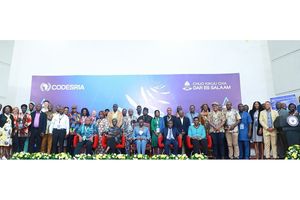Japan and Tanzania: Half a century of collaboration for agriculture development
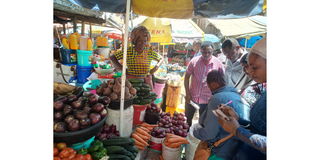
Market survey by farmers.
What you need to know:
JICA’s cooperation activities in the sector have currently been rolled out to cover the whole country.
Seed of almost 50 years of friendship between Tanzania and Japan was planted in Kilimanjaro region in 1974. In the year, Japan International Cooperation Agency (JICA) started implementing a series of cooperation projects with the formulation of the “Kilimanjaro Region Integrated Development Plan”.
Thereafter, development projects such as the “Lower Moshi Irrigation Scheme” and the “Kilimanjaro Agricultural Development Center” (currently called as the Kilimanjaro Agricultural Training Center (KATC)) were implemented.
JICA’s cooperation activities in the sector have currently been rolled out to cover the whole country. In the agriculture sector JICA is conducting two programs as follows:
i) Program of Supporting Agri-cultural Sector Development Program and
ii) Program of Strengthening Rice Production
i) Program of Supporting Agricultural Sector Development Program
Through this program, JICA continues to extend the support through its activities to respond to the needs of strengthening and promoting value addition and market- oriented agriculture, which is one of the priorities in the Agricultural Sector Development Program (ASDP) Phase (2016/2017–2025/2026). JICA, together with the Agricultural Sector Lead Ministries (ASLMs) including the Ministry of Agriculture (MoA) and President’s Office Regional Administration and Local Governance (PO-RALG) are now implementing one ongoing project, called “the Project for Strengthening DADP Planning and Implementation capacity through Use of SHEP Approach” (TANSHEP) for promoting market-oriented agriculture.
In 2020 we completed another project called “the Project for the Capacity Development on Data Collection, Analysis and Data-Based Reporting under ASDP” (ARDS Project).
This project aimed at strengthening the government’s Monitoring and Evaluation (M&E) system.
The capacity building component of the project has now been integrated into the curriculum of the Training Institutes of the MoA where it is taught to future extension officers.
“Anzia Sokoni, Malizia Shambani, Kwa Kipato Zaidi” The message of TANSHEP to transform agriculture from “Grow and Sell” to “Grow to Sell”
For 3 years since January 2019, JICA, in collaboration with the MoA and PO-LARG have been implementing the TAN-SHEP whose main objective is to change the mindsets of farmers on farming. Through this project, more farmers are now learning how to change their farming techniques from “Grow and Sell” towards “Grow to Sell”.
TANSHEP has been promoting the new extension approach, Smallholder Horticulture Empowerment & Promotion (SHEP), to a total of 56 farmers’ groups in Arusha, Kilimanjaro and Tanga Regions.
While traditionally farmers looked for the market after production (“Grow and Sell”), in the SHEP approach, they undertake market surveys before starting production, based on which they decide what to produce, how, and when according to the market needs (that is, “Grow to Sell”).
TANSHEP has provided them with a series of technical training programs e.g. on market survey, match-making with stakeholders, action planning, and record keeping for monitoring & evaluation.
TANSHEP puts forward the slogan: “Anzia Sokoni, Malizia Shambani, and Kwa Kipato Zaidi.” One of the farmers one, Mr. Joel Jackson Ikera, who was awarded the Annual Regional Best Farmer in Eastern Zone of Tanzania for 2020, urged fellow farmers that they should look at the market first before starting production, because in the market, they can know popular varieties, quality and volume traded, competitors and peak demand (high price) seasons.
The same message was also given by the former Minister for Agriculture, Hon. Japhet Hasunga, in his speech at Nanenane ceremony in 2020, in effect, disseminating the SHEP concept all over the country. The SHEP approach is by no means monetary support but provides the opportunities for farmers to know information and people for their business. And this “knowing something” can lead to farmers’ discovery, motivation, and development of strategy for their farming. For example, some farmers’ groups in Karatu District, (Migungani, Tujitegemee and Migombani Farmers Group (FG)), Arusha, which had traditionally produced onions solely, discovered through the market survey that there was demand for watermelons in the local markets and its production cost was much less than that of onions and profitable. Now their crop production has been diversified to grow potential vegetables, depending on market needs and profitability.
As for strategic marketing, TANSHEP designates FGs to run the profitability analysis before starting cultivation and keep contacting buyers to know on-going / expected prices until harvesting. Through this process, farmers get to think more strategically about their marketing. A good example is Mnadani FG in Lushoto District, Tanga, which originally planned to bring their sweet peppers to Dar es Salaam.
The group after conducting a market survey, finally decided to sell their produce at their local market, as they have found out that the prices were almost similar to those of Dar es Salaam. Selling their produce at the local markets helped to reduce transportation costs and gain more profits. TANSHEP has gradually but steadily accumulated the evidence that SHEP approach can work for the improvement of farmers’ lives. Umoja A FG in Lushoto DC, Tanga recorded in FY2019/20 around 30% increase of net income per crop / acre compared to that before starting TANSHEP (FY2018/19), despite hardship brought by COVID-19. Nguvu Kazi FG in Moshi DC, Kilimanjaro has also created a success story of tomato production for the peak demand season, from which members embarked on other new businesses (e.g. piggery).
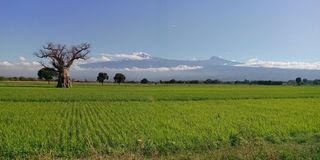
Paddy fields at Lower Moshi Irrigation Scheme.
To create more achievements, steady efforts are being made by the counterparts. With TANSHEP, MoA has been mainstreaming the SHEP approach in the agricultural extension system, through the revisions of the national extension 2021SUPPLEMENTand the training curriculum of extension officers. It has also provided technical advice to the target FGs by involving Horticultural Research andTraining Institute in Tengeru (HOR-TI-Tengeru).
PO-RALG has made cost-sharing arrangement with the target Local Government Authority (LGA) for implementation, while mobilizing Region-al Administrative Secretariats (RAS) for the field monitoring. Tanzania Cooperative Development commission (TCDC) has contributed to strengthening FGs e.g. through training pro-grams and study tours.
Tanzania Horticulture Association (TAHA) offers TANSHEP its marketing expertise and net-work with buyers.
In addition, several initiatives have been formed across the relevant institutions. For example, public relations inter-ministerial team has been producing a variety of PR goods including poster calendars with Mr. Mbwana Ally Samatta, a famous football player, who called on farmers to know the goal (markets), before shooting (cultivating), the concept of SHEP.
Another instance is the establishment of the SHEP certification system, which could provide a proof of the capacities of extension officers for guiding farmers in SHEP farming.
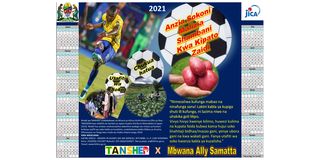
Of course, there are challenges arising during implementation e.g. effects of COVID-19, presence of fake seeds and agriculture inputs, and insufficiency of fund availabilities at field level.
But the presence of these challenges does not prevent the SHEP concept from flourishing and spreading over the country. Mr. Ippei ITAKURA, the Chief Advisor of the JICA expert team for TANSHEP argues, “TANSHEP can pave the way to create the a code of the conduct among our farmers, as far as we can enjoy our simple, clear and strong slogan, Anzia Sokoni, Malizia Shambani, Kwa Kipato Zaidi.”
ARDS Project: Agricultural data on the ground is ready to use for evidence based decision making
Since 2008 a series of projects aimed at improving the availability of agricultural information through the Agriculture Routine Data System (ARDS) were implemented. Through the ARDS project, a standardized formatted flow of data from the ward level to the central government level through the districts and regions has been developed.
The data are registered and accumulated into the web portal, which is a web-based application designed and developed for this specific purpose, and reports can easily be created from the data.
ARDS eventually allows users to capture, process and share the agricultural data through that web-based application. Using this system, over 90% of agricultural information across the country has been updated every month since 2017.
Considering that the submission rate of such data stood at 40% in 2015, it is a remarkable progress in two years. Now, ARDS Web Portal is in full operation across the country, and the data and reports generated from it are well utilized by the Government (e.g. in Agriculture Basic Data Booklet, downloadable at https://www.kilimo.go.tz).
ii) Program of Strengthening Rice Production
Under this program, JICA has assisted in disseminating rice farming technologies through various projects, i.e.
the Project for Supporting Rice Industry Development in Tanzania (TANRICE2), the Project for Capacity Development for the Promotion of Irrigation Scheme Development under the District Agricultural Development Plans (TANCAID2), the Small Scale Irrigation Development Project (SSIDP), etc.
TANRICE: Rice production increase and yield improvement achieved
For almost half a century from 1974, JICA and the MoA in Tanzania have been working together in the field of rice industry development.
Through a series of technical cooperation projects,various training programs on rice farming in irrigated as well as in rain-fed conditions were conducted for extension officers and farmers throughout the country. In these training programs, farmers also taught irrigation scheme management, gender, marketing, and agricultural machinery management.
A total of 5,235 farmers were trained in 44 irrigation schemes through the technical cooperation project called TANRICE1 (2007-2012). Subsequently, in TANRICE2 (2012-2019), these technologies and skills resulted in about 40% increase of rice production under the irrigated condition, 50% increase under rain-fed lowland condition, and 140% increase under rain-fed upland conditions. A total of 36,553 farmers and extension officers were trained through TANRICE2.
The program also contributed to the implementation of Tanzania’s National Rice Development Strategy (NRDS) which aimed at doubling rice production in Tanzania from approximately 0.89 million tons in 2008 to approximately 1.96 million tons by 2018 under the initiative of the Coalition for African Rice Development (CARD).
The goal of NRDS phase 2 launched in 2019 is to sustain national self-sufficiency in rice production, contribute to the regional self-sufficiency, and become the market leader in the region.
The cumulative irrigated area increased by 1.7 times from 264,388 ha (2005/2006) to 461,211 ha (2014/2015), according to the “National Irrigation Development Master Plan 2018” compiled by the joint survey of the National Irrigation Commission (NIRC) and JICA in 2018. Our cooperation through the Program of Strengthening Rice Production has contributed to the increase of rice yield and irrigation development.
SSIDP & TANCAID2: Comprehensive Guidelines for Irrigation Scheme Development (CGL) as the ground of irrigation development.
JICA and NIRC have been promoting participatory irrigation scheme development in line with the CGL. In
SSIDP, approximately 32 million USD have been provided for the construction and rehabilitation of small-scale irrigation facilities including head works and canals of up to 109 irrigation schemes in the whole country.
Through these measures, an increase of around 20,000 ha of irrigated area is expected to be achieved. In addition to infrastructure improvement, a total of 9,921 people including irrigation engineers and technicians of NIRC and district offices, and members of irrigators’ organizations (IO) received training on proper project management and operation & maintenance (O&M) of the facilities as some of the activities of TANCAID2.
In addition to the key cooperation areas depicted above, construction works for the Project for Development of Malindi Fish Landing and Marketing Facilities in Zanzibar commenced in 2019.
Reforming Malindi Fish Landing and Marketing Facilities in Zanzibar
Through JICA’s support, a Japanese contractor started rehabilitating the old erosion-prone Malindi Fish Landing and Marketing Facilities to contribute to the provision of safer and more hygienic working condition for the users, thus promoting stable supply of quality fish to the people of Zanzibar.
The facilities are expected to accommodate fishing vessels, create jobs for people in the sector, and increase the earnings of stakeholders in fisheries value-chains, thereby bringing out the potential of blue economy in Zanzibar and boosting it. JICA understands that the investment by the private sector is another indispensable driving force for the country’s development. Several private Japanese companies have, in that regard, come to Tanzania with JICA’s support.
Small and Medium-Sized Enterprise Partnership Survey for Beekeeping Business in Tanzania
Nisshin Honey Co. Ltd. was established in 1961. Since then, it has been running its business of honey production and sales in Japan. Nisshin Honey is ranked second in the share of the bee-keeping industry in Japan.
The company has an efficient bee-keeping model utilizing modern beekeeping technology, knowledge and experience to export honey and pollinate monoculture crop.
The expected scenario of their business in Tanzania is to establish a joint venture with a local company to produce competitive honey products by introducing its beekeeping technology.
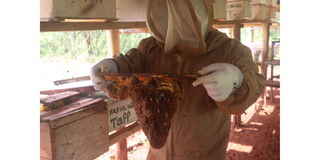
Harvesting honey in the field.
As an entry point, the company is conducting a survey on information collection and doing analysis for better understanding of current status in beekeeping technology.
As an entry point, the company is conducting a survey on information collection and doing analysis for better understanding of current status in beekeeping industry in Tanzania to consider the future business plan.

